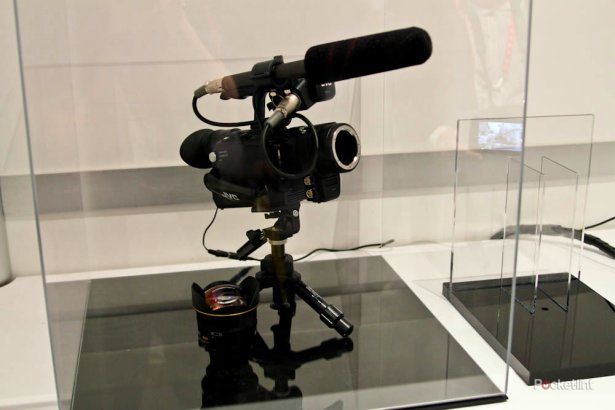JVC has been working on a low-cost 4K resolution camera since 2007, and it seems to have finally managed to make it a reality with the announcement that it will launch the GY-HMQ10 straight away.
The camera, which is expected to cost around £3,300 boasts an 8.3-megapixel sensor that produces video with a resolution of 3840x2160. That's very slightly less resolution than a full-blown 4K digital cinema camera will shoot, but it's over the resolution you'd end up seeing projected, digitally, at your local cinema. It is, however, worth pointing out that 3840x2160 is called QFHD, or Quad Full High Definition, meaning it's equivalent to 4x1080p.
JVC is also keen to point out that the camera also has the skill needed to produce astonishing 1080p. That's got a lot to do with the high-quality optics the company has to use for 4k resolution, which easily eclipses those found on most domestic 1080p cameras.
Recordings are stored on SD and SDXC cards. The camera records at a rate of up to 144Mpbs - most 1080p camera use a rate around 25-28Mpbs, while broadcast cameras generally record at 50Mpbs. A variable bitrate (VBR) h.264 codec takes care of compression, and JVC says you can get up to 2 hours of footage on to an SD card - although it doesn't mention at which capacity.
The main delay getting 4K video into camcorders, or even digital SLRs, is one of processing power. The sensors to capture at this resolution have been around for some time, but JVC says that it's thanks to its new Falconbrid LSI processing images which are taken from the CMOS sensor and de-bayered - which is necessary for images coming from a single CMOS chip - all in real-time. You can output 4K video in almost real time too, which JVC says opens this camera up for all sorts of applications.
The camera has a non-removable f/2.8 lens, which includes a 10x optical zoom. There's also an optical images stabiliser, 3.5-inch touchscreen and a viewfinder. Audio isn't neglected either, with XLR sockets - crucial for serious videography, or broadcast-capable cameras.
As with JVCs other camcorders in the semi-pro market, the resulting video is directly compatible with the likes of Apple's Final Cut Pro, which makes it incredibly popular with people who don't want to mess about converting footage for editing.
You might ask, after all that: what's the point? Well, 4K is, believe it or not, coming. TVs are starting to turn up at the likes of CES. There have been projectors capable of displaying the format for some time, and even YouTube can handle 4k video now. And, most exciting of all, a camcorder like this opens up cinemas to independent film makers in a way that wasn't possible 10 years ago. Anyone with a good idea, some good actors and bit of skill could record something on this camera, and then show it at their local multiplex.
Are you an aspiring film-maker, does this camera get your creative juices flowing?

